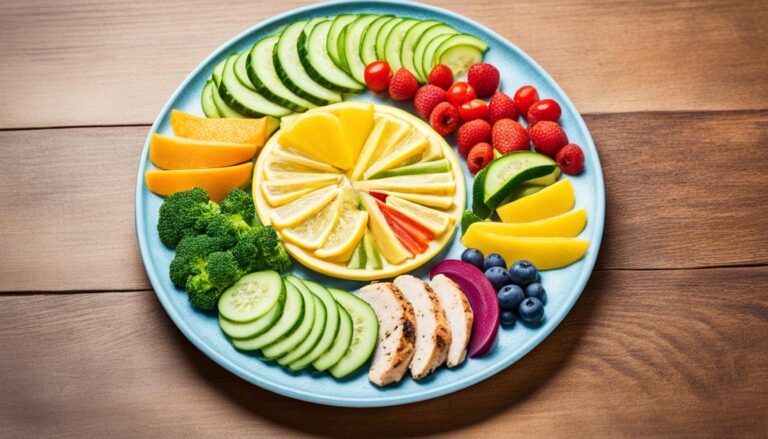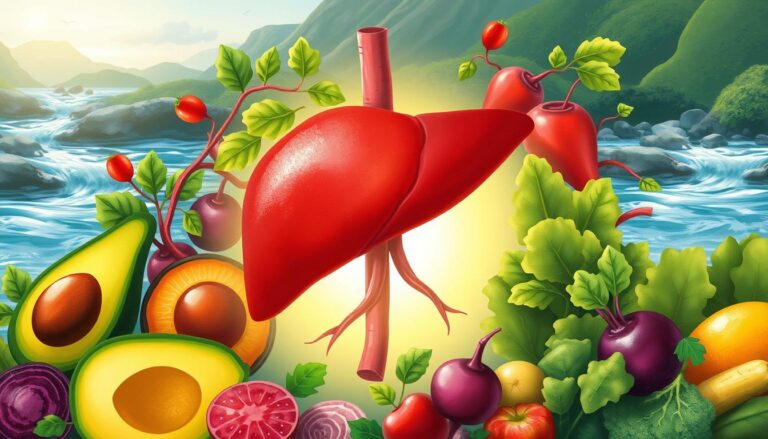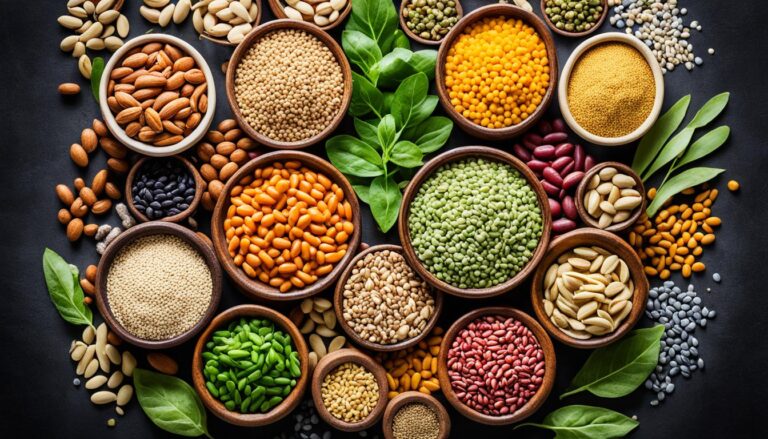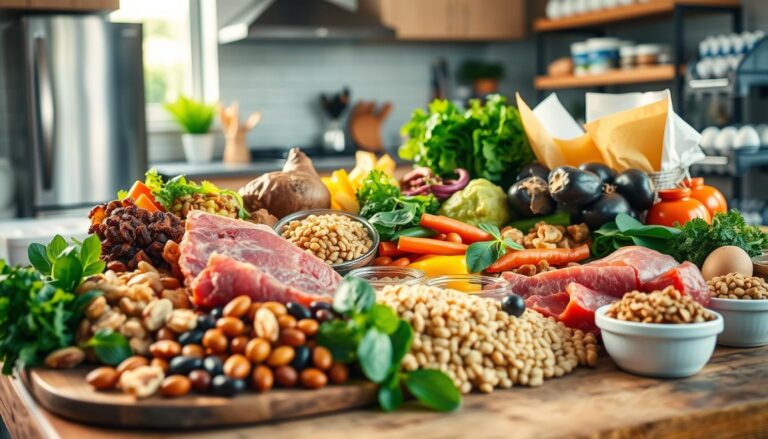Are you looking for a natural way to lose weight? Weight loss juices might be the answer. These juices are full of nutrients and can help you reach your fitness goals. But, which juices really work for weight loss? Let’s find out the best juices for losing weight.
Key Takeaways
- Discover the most effective weight loss juices to help you shed pounds and boost your health
- Learn about the unique benefits of different juices, from nutrient density to appetite-suppressing properties
- Understand the importance of incorporating juices into a balanced, sustainable diet for long-term weight management
- Explore the potential risks and considerations of juice fasts and cleanses, and how to approach juicing safely for weight loss
- Gain insights into the role of juicing in supporting overall wellness and a healthy lifestyle
Weight loss juices: A nutrient-packed approach
Drinking 100% fruit or vegetable juice can help with weight loss. It adds important nutrients and supports health. Juices are easy to add to your diet, but eating whole fruits and veggies is better. They give you more fiber, which helps you feel full.
Choosing whole fruits and veggies keeps more fiber in your diet. This helps you feel full longer. But, some juices have a lot of sugar and not much fiber. This can lead to more calories and weight gain. It’s key to pick juices that are 100% and full of nutrients.
Juicing for weight loss: Pros and considerations
Juicing can be good for weight loss, but there are downsides. It might help you lose water weight at first. But, it can also lead to losing muscle instead of fat. Juices have a lot of sugar because they’re made from fruit. This sugar is absorbed quickly, causing blood sugar to rise.
Drinking too few calories from juice cleanses can be bad. It might lead to weight loss at first, but you’ll likely gain it back. Losing weight healthily means eating a balanced diet with enough calories, protein, healthy fats, and fiber.
Making your own juices with more veggies and less fruit can be better. It cuts down sugar and boosts nutrients. But, the best way to lose weight is through a balanced diet, not just juices or cleanses.

“Juicing can be a valuable addition to a balanced diet for weight loss, but it’s essential to be mindful of potential drawbacks.”
Celery juice: Low in calories, high in hydration
Celery juice is a refreshing choice for those looking to lose weight and stay healthy. It’s very low in calories but packed with nutrients. This juice is full of vitamins, minerals, and antioxidants, offering many health benefits.
One cup of celery juice has only 33 calories and 3 grams of sugar. It’s a better choice than sugary drinks. It also has 2 grams of protein and small amounts of calcium, magnesium, and vitamins A, C, and K.
The juice is mostly water, which helps with hydration and may reduce inflammation. The antioxidants in celery can fight oxidative stress and lower disease risk. Research in mice shows it may also improve gut health.
While some claim celery juice detoxifies or treats health issues, the science is not strong. Yet, it’s a low-calorie, hydrating, and nutritious drink. Adding it to a healthy diet and exercise plan can be beneficial.
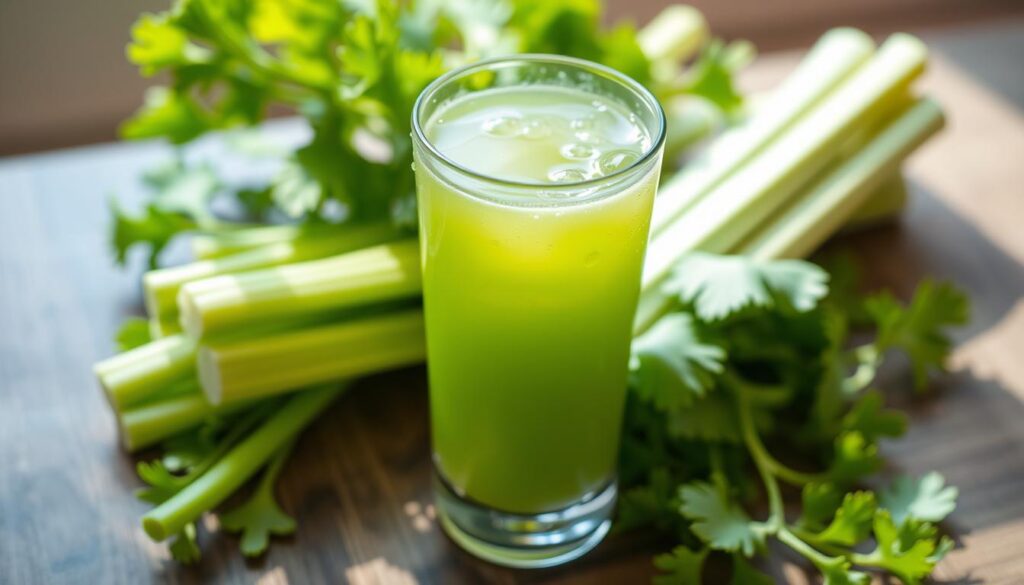
Celery Juice Combinations for Weight Loss
Here are some ways to make celery juice even better for weight loss:
- Watermelon celery juice: Combines the hydrating properties of celery and watermelon to support weight loss.
- Celery juice with pear and cucumber: The diuretic effects of these ingredients can help reduce fluid retention.
- Celery juice with pineapple and mint: Improves digestion and reduces belly fat.
- Celery juice with carrots and ginger: The fiber-rich carrots and antioxidants from celery can help curb appetite and aid digestion.
- Celery juice with apple and cinnamon: The diuretic properties of apples and the thermogenic nature of cinnamon can boost metabolism and fat burning.
By adding celery juice and its combinations to a healthy diet and exercise, you can help reach your weight loss goals. Enjoy its hydrating and anti-inflammatory benefits.
Beet juice: A performance-boosting powerhouse
Beetroot juice is amazing for athletes and fitness lovers. It’s packed with dietary nitrates. These nitrates boost endurance, muscle efficiency, and athletic performance.
Unlocking Enhanced Endurance
A review of studies shows beetroot juice boosts athletic performance. It’s especially good for high-intensity workouts. The nitrates in beet juice help athletes last longer at high intensities.
Cyclists who drank beetroot juice did 0.8% better in a 50-mile race. Runners ran 5% faster in the last part of a 5,000-meter race after drinking beet juice.
Boosting Muscle Efficiency and Oxygen Utilization
Beets help the body use oxygen better. This gives athletes a performance boost. Beet juice can increase oxygen use by up to 20%.
The nitrates in beets also make muscles more efficient. This means athletes can exercise harder for longer without getting tired. Studies show athletes who drank beet juice could keep up exercise intensities from 60 to 80% longer.
Harnessing Beet Juice’s Versatility
Beet juice is easy to add to any diet. You can drink it alone, mix it with other juices, or use it in cooking. It’s a great way to get essential nutrients for better athletic performance.
To get the most benefits, drink beet juice about 150 minutes before a workout or event. If you’re training at high altitudes, start drinking beet juice at least six days before a competition.

Beet juice is full of nutrients like dietary nitrates, antioxidants, and more. It’s a powerful tool for athletes looking to improve endurance, muscle efficiency, and overall performance.
Pomegranate juice: Antioxidant-rich and appetite-suppressing
Pomegranate juice is not only tasty and refreshing. It also has many benefits for weight loss. This vibrant red juice is full of antioxidants and polyphenols that support health and fitness.
Research shows pomegranate juice can help with weight loss. The polyphenols in it may help you feel full and eat less. It also has antioxidants that could fight inflammation and obesity, helping with conditions like type 2 diabetes.
Pomegranate juice is also full of important vitamins and minerals. It’s rich in vitamin C, which boosts your immune system, and vitamin K, which is good for bones. Plus, it has a lot of fiber, which is great for your digestive health.
| Nutrient | Amount in 8 oz (237 ml) of Pomegranate Juice |
|---|---|
| Calories | 135 |
| Carbohydrates | 34 g |
| Fiber | 1 g |
| Vitamin C | 30 mg |
| Vitamin K | 8 mcg |
To add pomegranate juice to your weight loss plan, try replacing sugary drinks with it. You can also use it in recipes like smoothies, salad dressings, or marinades. Just remember to drink it in moderation because of its natural sugars. Pair it with a healthy diet and exercise for the best results.

Green veggie juices: Fiber-rich and nutrient-dense
Green juices from leafy greens like kale, spinach, and cabbage are nutritional powerhouses. They are full of fiber, antioxidants, and vitamins and minerals. These drinks can boost a balanced diet for weight loss and health.
The Nutrient Benefits of Green Juices
Kale and romaine are loaded with vitamins and nutrients. Spinach has similar benefits but tastes milder. Kale is packed with vitamins A, C, K, and B6, plus calcium and manganese.
The Green Cleanse Smoothie is full of vitamin C for immune health. The Digestive Aid Green Juice has ginger and fennel for anti-inflammatory effects.
Green juices also offer a lot of fiber. The Institute of Medicine suggests 25 grams of fiber daily for women and 38 grams for men. This fiber is crucial for heart health, blood sugar, and cholesterol.
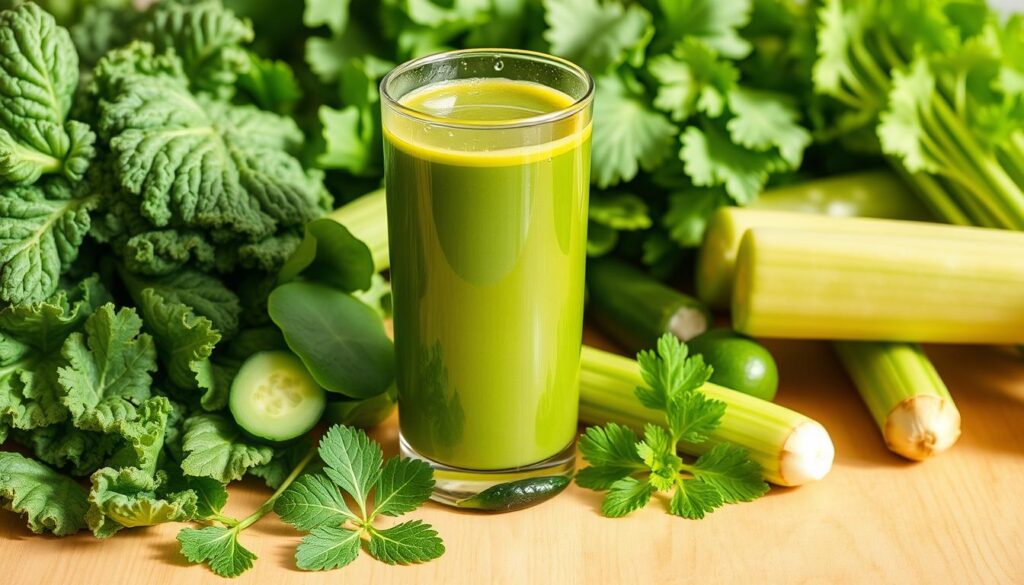
“Research indicates that leafy green vegetables consumed daily can help reduce inflammation, heart disease risk, and age-related mental decline.”
But, green veggies are high in oxalic acid, which can cause kidney stones. It’s important to drink green juice in moderation to avoid problems with blood sugar and kidney function.
Adding green juices to your diet can bring many benefits. You’ll get more fiber, antioxidants, and hydration. Always talk to a healthcare professional before making any big changes to your diet.
Watermelon juice: Hydrating and low in calories
Watermelon juice is a refreshing and nutritious drink for those on a weight management journey. It’s sweet, hydrating, and low in calories. It also has essential vitamins, minerals, and antioxidants that are good for your health.
Watermelons are 92% water, making watermelon juice great for staying hydrated. Drinking enough water is key for weight loss. It helps prevent hunger caused by dehydration. Plus, the juice’s high water content keeps you full longer, reducing the urge to eat too much.
Compared to sugary drinks like sodas and juices, watermelon juice is a healthier choice. It has natural fruit sugars, not refined or artificial sweeteners. This gives you a sweet taste without the bad effects of added sugars.
The benefits of watermelon juice go beyond just hydration and weight management. It’s also full of vitamins, minerals, and antioxidants that boost your health. The citrulline in watermelon may even help burn fat faster by improving amino acid metabolism.
If you want to add watermelon juice to your weight loss plan, choose fresh, homemade juice. Avoid pre-made juices with added sugars and less nutrition. Mixing watermelon juice with protein or blending it into smoothies can make it even more effective for weight loss.
“Watermelon juice is a refreshing and hydrating choice that can support your weight management goals without compromising taste or nutrition.”
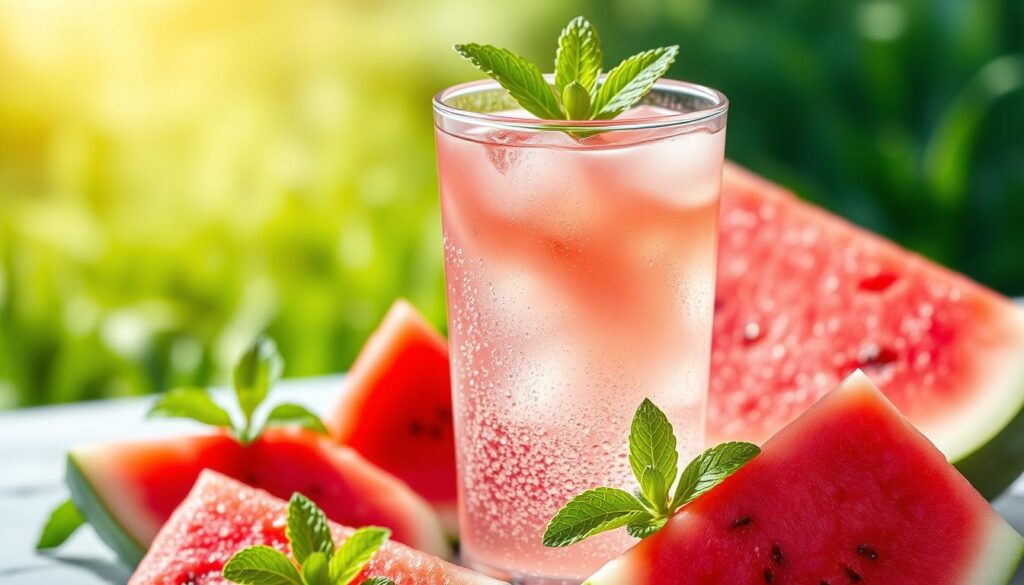
Lemon-ginger green juice: A metabolism-boosting blend
Lemon-ginger green juice is a tasty way to add to your diet. Lemons add flavor and antioxidants. Ginger boosts metabolism, reduces hunger, and aids in weight loss.
Ginger is also packed with antioxidants. These help fight cancer, diabetes, and ulcers. Adding spinach to the mix increases fiber, keeping you full.
Packing a Nutritional Punch
This juice is full of nutrients. It has about 170 calories, 3 grams of protein, and 5 grams of fiber. It’s also rich in vitamins C, A, and K, and minerals like potassium and magnesium.
“Lemon and ginger are known for their high concentration of anti-inflammatory and antioxidant properties, making this juice a true powerhouse for your health and metabolism,” says Chef Ari Sexner, a world-class juicing expert.
Each 4-ounce shot has only 25 calories. It includes lemon, ginger, green apple, celery, and cayenne. These small shots are full of vitamins and antioxidants.
They boost your immune system, ease arthritis, balance pH, and improve eyes and brain. If you want to boost your metabolism, reduce hunger, or just enjoy a healthy drink, try lemon-ginger green juice.
Carrot juice: Rich in carotenoids and fiber
Carrot juice is a nutritional powerhouse. It’s packed with compounds that help with weight loss. It’s rich in vitamin A-rich carotenoids and fiber, offering many health benefits.
The carotenoids in carrot juice give it its orange color. These pigments are antioxidants in the body. A study showed men with obesity lost belly fat by drinking carotenoid-rich beverages daily.
Carrot juice is also high in dietary fiber. Fiber helps you feel full and can control appetite. This is great for those trying to lose weight. A study found people who drank carrot juice felt fuller and ate fewer calories.
| Nutrient | Amount per 8-ounce Glass | % Daily Value |
|---|---|---|
| Calories | 80 | – |
| Carbohydrates | 17g | 6% |
| Fiber | 2g | 7% |
| Vitamin A | 800% | – |
| Vitamin C | 22% | – |
| Vitamin K | 31% | – |
| Potassium | 15% | – |
Carrot juice is a great addition to a healthy lifestyle. It’s full of nutrients and can help with weight loss. Enjoy it on its own or as part of a juice-based diet for better health and weight management.
Weight loss juices: Kale-apple fusion
The mix of kale and apples makes a great weight loss juice. It’s full of nutrients and fiber. This kale-apple juice is a better choice than sugary juices, helping you lose weight.
Kale is packed with fiber, vitamins, and minerals. It helps keep blood sugar stable. Apples support a healthy gut, which is key for weight management. Together, they make a tasty, healthy juice for losing weight.
Adding celery for hydration, lemon for a zesty taste, and ginger for a metabolism boost can enhance the juice. This kale-apple juice is a great way to stay energized and on track with your health goals.
| Nutrition Facts | Per Serving |
|---|---|
| Calories | 80 |
| Total Fat | 0g |
| Carbohydrates | 14g |
| Sugars | 14g |
| Protein | 2g |
| Sodium | 40mg |
| Dietary Fiber | 0g |
This kale-apple juice combines apple, celery, cucumber, and more. It’s a nutrient-rich drink that supports your weight loss goals.
Juicing for weight loss: Pros and considerations
Juicing can be good for losing weight when done right. But, it’s important to watch out for some downsides. Juicing might cut down on fiber and up the sugar intake. It also takes more time and money to prepare.
Some worry that juicing can cause blood sugar to rise too fast. Yet, studies show that 100% fruit juice doesn’t lead to obesity, diabetes, or heart disease.
To get the most out of juicing for weight loss, choose 100% juice. Blend it to keep some fiber. And always drink it as part of a balanced diet.
Juicing Pros and Cons
- Juicing offers a rich mix of nutrients, vitamins, and antioxidants from fruits and veggies.
- It’s a quick way to get more fruits and veggies, especially for those who find it hard to eat enough.
- It’s good for people with digestion problems who can’t handle whole fruits and veggies.
- Juicing takes out the fiber, which is key for a healthy gut and weight loss.
- It can lead to too much sugar, causing blood sugar spikes and weight gain if not balanced.
- It’s pricier and takes longer than eating whole fruits and veggies.
| Juicing for Weight Loss | Eating Whole Fruits and Vegetables |
|---|---|
| May provide a concentrated source of nutrients | Retain more fiber and other beneficial plant compounds |
| Can be a convenient way to increase fruit and vegetable intake | Provide a more balanced and satiating nutrient profile |
| May be beneficial for those with digestive issues | Support a healthy gut microbiome and overall health |
| Can lead to high sugar intake and blood sugar spikes | Promote a more gradual and sustainable weight loss |
To get the most from juicing for weight loss, choose 100% juice. Blend it to keep some fiber. And always drink it as part of a balanced diet with whole fruits and veggies.
“Juicing removes the fiber content from fruits and vegetables, which is an essential nutrient for maintaining a healthy digestive system and supporting weight loss.” – Dr. Vuu
Conclusion
Many healthy and tasty juices can help with long-term weight loss when added to a balanced diet. The best weight loss juices have less sugar, more fiber, and lots of vitamins, minerals, and antioxidants. Blending fruits and veggies instead of juicing keeps more fiber, which helps you feel full.
Healthy juicing is a great way to get more fruits and veggies. But, it’s important to avoid only drinking juice or fasting. These methods are not good for long-term weight loss and can be harmful to your health. Adding juices to a balanced diet helps you get more nutrients for sustainable weight loss.
It’s important to watch out for the downsides of juicing. Too much sugar from store-bought juices or unhealthy eating habits can be a problem. To see lasting results, eat a variety of whole foods, drink plenty of water, and exercise regularly. This approach helps manage weight in a healthy and lasting way.
